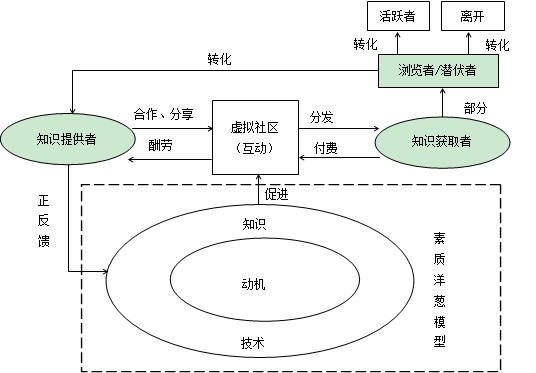 PDF(1689 KB)
PDF(1689 KB)


 PDF(1689 KB)
PDF(1689 KB)
 PDF(1689 KB)
PDF(1689 KB)
知识付费是虚拟社区知识共享困境的一剂良药?——以知乎为例
Is Knowledge Payment a Good Medicine for the Dilemma of Knowledge Sharing in Virtual Community? — Zhihu Live
[目的/意义] 伴随移动互联网的快速发展,虚拟社区推出付费知识产品后,社区激励政策改变了现有的知识共享模式,也有益于解决用户消极共享与参与的困境。[方法/过程] 基于激励理论,辅以素质洋葱模型,构建虚拟社区付费知识共享模型,并以知乎旗下的知识Live付费产品为例,从中发现付费知识产品的关键特征,即专业性知识、易用性提高效率以及有用性自我提升。[结果/结论] 付费知识的推出有助于解释用户消极分享困境问题;付费知识的关键特征与素质洋葱模型的知识、动机与技术特征相一致。本研究对知识付费平台的建设与发展具有理论与实践指导价值。
[Purpose/significance] With the rapid iteration of mobile internet, after the virtual community launches knowledge payment products, changes in community incentive policies break the existing knowledge-sharing model, these are beneficial to solve users’negative sharing predicament. [Method/process] Based on the motivation theory and the quality onion model, this paper constructeda virtual community pay-per-view knowledge sharing model. Then, this paper took the knowledge of its own paid product as an example to discover the key features of knowledge payment products, namely, professional knowledge, ease of use improves efficiency and usefulness promotes itself. [Result/conclusion] The study finds that the introduction of paid knowledge helps to explain the dilemmas of users sharing negatively; the key features and qualities of knowledge payment are consistent with the knowledge, motivation and technical characteristics of onion models. So, this research has theoretical and practical value for the construction and development of knowledge payment platform.

虚拟社区 / 知识共享 / 激励理论 / 知识付费 / 在线 / 知乎Live
virtual community / knowledge sharing / incentive theory / knowledge payment / online Zhihulive
| [1] |
何超, 张建琦, 刘衡. 分享经济: 研究评述与未来展望[J]. 经济管理, 2018, 40(1): 191-208.
|
| [2] |
赵鹏. 学术博客用户知识共享意愿的影响因素研究——以科学网博客为例[J]. 情报杂志, 2014, 33(11): 163-168, 187.
|
| [3] |
NONNECKE B, PREECE J. Why lurkers lurk[C]//Americas conference on information systems. Boston: AMCIS, 2004:1-10.
|
| [4] |
彭小晶, 郑小强. 虚拟社区知识共享困局及应对——基于无限重复博弈[J]. 现代情报, 2015(3): 34-36, 56.
|
| [5] |
舍基. 认知盈余[M]. 北京: 中国人民大学出版社, 2012.
|
| [6] |
CARSON A. Behind the newspaper paywall - lessons in charging for online content: a comparative analysis of why Australian newspapers are stuck in thepurgatorial space between digital and print[J]. Media culture & society, 2015, 37(7): 1022-1044.
|
| [7] |
YANG N. Building the wall[J]. Editor &publisher, 2012, 186(2503): 34-41.
|
| [8] |
秦洁. 知识付费兴起原因探析及前景展望[J]. 新媒体研究, 2017(20): 55-56.
|
| [9] |
王敏. “付费墙”二十年:全球经验与中国省思[J]. 现代传播(中国传媒大学学报), 2017, 39(4): 7-11.
|
| [10] |
曾繁旭, 王宇琦.移动互联网时代内容创业的盈利模式[J]. 新闻记者, 2016(4): 20-26.
|
| [11] |
贾琳. 移动互联网背景下知识付费模式的发展机遇[J]. 新闻传播, 2017(20): 55-56.
|
| [12] |
袁玺, 刘声峰, 董亚峰.听见未来——浅析我国有声书生态[J]. 出版广角, 2017(19): 6-8.
|
| [13] |
邱慧华. 从习惯免费到接受付费——用户需求层次的再升级[J]. 中国电信业, 2017(10): 50-51.
|
| [14] |
赵保国, 姚瑶. 用户持续使用知识付费APP意愿的影响因素研究[J]. 图书馆学研究, 2017(17): 96-101.
|
| [15] |
喻国明, 郭超凯. 线上知识付费:主要类型、形态架构与发展模式[J]. 编辑学刊, 2017(5): 6-11.
|
| [16] |
知识付费经济报告:多少中国网民愿意花钱买经验|真相大数据[EB/OL]. [2016-08-08]. http://tech.qq.com/a/20160808/007138.htm.
|
| [17] |
RHEINGOLD H. The Virtual Community: Homesteading on the Electronic Frontier[M]. London: MIT Press, 1993.
|
| [18] |
ARMSTRONG A, HAGEL J. The real value of online communities[J]. Harvard business review, 1996, 74(3): 134-141.
|
| [19] |
赵捧未, 马琳, 秦春秀. 虚拟社区研究综述[J]. 情报理论与实践, 2013, 36(7): 119-123.
|
| [20] |
曾群, 陈鑫, 文章. 虚拟社区知识共享平台的资源建设研究[J]. 图书馆学研究, 2015(7): 54-58, 18.
|
| [21] |
TUCKER A W.A two-person dilemma[M]. Palo Alto:Stanford University Press, 1950.
|
| [22] |
范如国. 博弈论[M]. 武汉: 武汉大学出版社, 2011.
|
| [23] |
FINHOLT T, SPROULL L S. Electronic groups at work[J].Organization science, 1990, 1(1): 41-64.
|
| [24] |
ARDICHVILI A, PAGE V, WENTLING T. Motivation and barriers to participation in virtual knowledge‐sharing communities of practice[J].Journal of knowledge management, 2003, 7(1): 64-77.
|
| [25] |
张敏, 郑伟伟, 石光莲. 虚拟学术社区知识共享主体博弈分析——基于信任的视角[J]. 情报科学, 2016, 34(2): 55-58.
|
| [26] |
PORTER L W, LAWLER E E. Managerial attitudes and performance[J]. Industrial & labor relations review, 1968, 23(1): 199-204.
|
| [27] |
SMITH T W, PITTMAN T S. Reward, distraction, and the over justification effect[J]. Journal of personality & social psychology, 1978, 36(5): 565-572.
|
| [28] |
LEWIN K. A dynamic theory of personality[M]. New York: McGraw-Hill, 1935: 286.
|
| [29] |
金辉. 内、外生激励因素与员工知识共享:挤出与挤入效应[J]. 管理科学, 2013, 26(3): 31-44.
|
| [30] |
刘蕤. 虚拟社区知识共享影响因素及激励机制探析[J]. 情报理论与实践, 2012, 35(8): 39-43.
|
| [31] |
周婷, 邓胜利. 社交网站用户知识贡献行为机理分析[J]. 情报资料工作, 2014, 35(5): 28-32.
|
| [32] |
孔德超. 虚拟社区的知识共享模式研究[J]. 图书馆学研究, 2009(10): 95-97.
|
| [33] |
徐小龙, 王方华. 虚拟社区的知识共享机制研究[J]. 自然辩证法研究, 2007(8): 83-86.
|
| [34] |
CHANG A M, KANNAN P K., WHINSTON A B. Electronic Communities as Intermediaries: The Issues and Economics[C]//Proceedings of the 32nd Hawaii international conference on systems sciences. Hawaii: IEEE, 1999: 504.
|
| [35] |
HAGEL III J, ARMASTRONG, A G. Net gain: expanding markets through virtual communities[M]. Charles: Michinsey & Company Inc., 1997.
|
| [36] |
HALL H, GRAHAM D. Creation and recreation: motivating collaboration to generate knowledge capital in online communities[J]. International journal of information management, 2004, 24(3): 235-246.
|
| [37] |
VALARIE A, ZEITHAML. Consumer perceptions of price, quality, and value: a means-end model and synthesis of evidence[J]. Journal of marketing, 1988, 52(3): 2-22.
|
| [38] |
HAMARI J, SJÖKLINT M, UKKONEN A. The sharing economy: why people participate in collaborative consumption[M]. Hoboken: John Wiley & Sons, Inc., 2016.
|
| [39] |
丁栋虹, 杨志博. 社会化问答网站知识共享的影响因素——基于知乎的案例研究[J]. 管理案例研究与评论, 2016, 9(3): 212-223.
|
| [40] |
刘周颖, 赵宇翔.基于语音互动的付费知识问答社区运营模式初探——以分答和值乎为例[J]. 图书与情报, 2017(4): 38-46.
|
| [41] |
BOYATZIS R E. The competent manager: a model for effective performance[M]. New York: Wiley, 1982.
|
卢艳强: 负责论文构思、撰写与修改;
李钢: 指导论文撰写,提出修改意见。
/
| 〈 |
|
〉 |